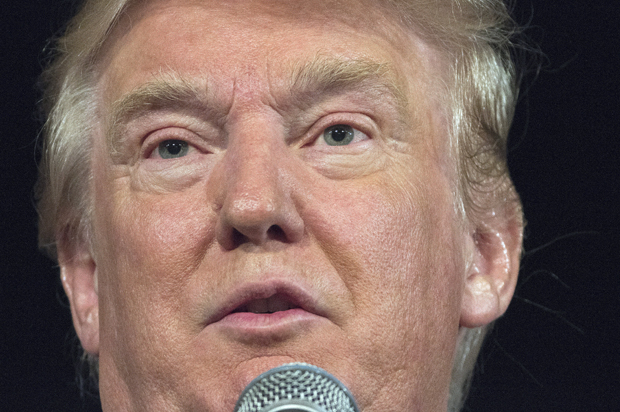A recent survey done by Public Policy Polling has sparked a great deal of bemused horror. In a group of 897 likely Republican Primary voters, the left-leaning organization found that Trump supporters were most likely to wish the South had won the Civil War and to think Japanese internment was a good idea. Compared to those who backed other candidates, Trump’s supporters were also most likely to support bans on homosexuals entering the United States and the very practice of Islam. As reported by the New York Times, “The results suggest…[Trump has] built a significant part of his coalition of voters on voters who are responsive to religious, social and racial intolerance.”
The Times infers not just that Trump’s rise has been fueled by bigotry and intolerance, but also that said bigotry and intolerance predated him. As evidence, it notes that Trump supporters maintain prejudicial attitudes surrounding matters that “he has not talked very much about on the campaign trail. He has said nothing about a ban on gays in the United States, the outcome of the Civil War or white supremacy. Yet on all of these topics, Mr. Trump’s supporters appear to stand out from the rest of Republican primary voters.”
It’s thus worth noting, according to the Times, that Trump “isn’t persuading voters to hold these beliefs. The beliefs were there – and have been for some time.”
A few months ago, PPP managed to grab the news cycle with a December press release which revealed that 54 percent of Republicans supported Trump’s proposed Muslim ban. To liven things up, the firm asked whether voters wanted to bomb Agrabah, the country from the movie Aladdin. It found that 30 percent of Republicans, and 41 percentof Trump supporters, supported the attack. (At the time, some pretended to be above the fray by noting that 36 percent of Democrats were opposed to bombing the fictional nation, drawing a false equivalence between ignorant pacifism and ignorant bloodlust, bloodlust largely driven by Islamophobia.)
The poll unintentionally captured what might be termed a polling observer effect– a scientific term used to describe processes which necessarily alter the quantity they are attempting to measure. Once a mainstream candidate has legitimized a policy proposal, once the nativism has entered the ether, it’s hard to discern whether polls are capturing people’s previously held beliefs, or whether their priorities have been swayed. Sure, polls might show that Republicans support halting Muslim immigration, but what if the question had never been polled to begin with?
It’s unreasonable to expect Trump voters, or any voters, for that matter, to distinguish between his actual platform and parodies thereof. The candidate himself can barely keep his proposals straight. The fact that Trump’s coalition supports extremist policies which the candidate has never explicitly addressed doesn’t mean that he has not invigorated and renewed the prejudices upon which they rely. The Public Policy poll simply reveals that Trump voters are united by these prejudices, by their fear of other, and that various isms and phobias are correlated, conclusions to which I give a resounding duh.
Much as voters hadn’t considered adorable, fez-wearing monkeys a national security threat before the Agrabah poll, they needn’t have been firm in their perspectives on historical injustices or immigration screening for religion and sexuality before this one. Instead, the polls illustrate that people cling strongly to broad conceptions of their political identities without independently translating them to specific policy proposals. They feel uncomfortable and out of place in a rapidly changing culture, so glorify the old South. They are fearful of what they might term “radical Islamic terrorism,” so support an actively aggressive policy toward the Middle East. They have a strong animus toward Ted Cruz so, in a PPP poll released Friday, 38 percent of them suggest he might be the Zodiac killer.
Indeed, discrepancies can be quelled with an incentive effect. A recent study found a significant partisan divide when Republicans and Democrats were asked factual questions about issues like the budget deficit and American casualties in in Iraq. When respondents were told they’d be entered in a drawing for a $200 Amazon gift card for each correct answer, the partisan divide lessened by about 55 percent. The results suggest that participants aren’t exerting their entire cognitive capacity when casually completing a survey, and their responses are instead knee jerk reactions that don’t capture nuance or depth in their underlying worldviews.
Using such poll results to promote the notion that Trump’s platform is but a reflection of his supporters’ prejudices discounts the very real dangers of demagoguery. Instead, they should be used to highlight how easy it is for opportunists to exploit those prejudices to serve their own sick, self-aggrandizing ends. To emphasize the importance of reasoned leadership and responsible policy formation by well-informed experts, along with an independent judiciary that protects individual rights at all costs.
These results, and reactions to them, also call into question the utility of such outlandish polls to begin with. PPP has a clear liberal bias and a vested interest in drawing shocking conclusions from scant data for the purposes of winning attention from the press. By and large, this attention has consisted of attempts to shame and mock Trump voters for their arcane and ignorant views, a self-defeating tactic that inevitably increases his appeal. In the mean time, it is a tactic that bolsters a sense of community amongst his supporters, emboldening them in their hateful views and promoting the silent majority narrative that has fueled Trump’s campaign, one that would place such extremist policies in the realm of the politically feasible. To the victims of this hatred, its damage is truly immeasurable.

